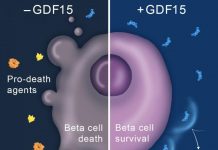June 2003 - The Immune Tolerance Network (ITN) announced preliminary results from its 36-patient multicenter clinical trial of the Edmonton Protocol for islet transplantation, confirming in an early analysis that the treatment for type 1 diabetes pioneered in Edmonton, Canada, can be successfully replicated at other clinical sites.
Of the 15 patients able to complete their transplants, 12 (80%) are currently insulin-free, in some cases for up to one year. In the course of the study, two patients voluntarily withdrew due to side effects of the anti-rejection therapy and six graft failures were reported following initial transplant. When these patients are included in the analysis, the rate of insulin independence is 52% at this point in the trial. The remaining patients, at various stages in their treatment are currently exhibiting decreased insulin requirements. Differences in success rates between individual clinical centers were noted, which investigators say underscore the challenges that lie ahead in the widespread adoption of the technique.
Presenting their preliminary findings at the 2003 American Transplant Congress held in Washington, DC, the investigators discussed the results from the approximate midway point of the study that aims to validate the success reported by the Edmonton transplant team in June 2000. With nine clinical centers participating in the trial, the ITN study is the largest-scale clinical investigation of islet transplantation to date. The ITN and the trial are supported by the National Institute of Allergy and Infectious Diseases, with additional funding from the National Institute of Diabetes and Digestive and Kidney Diseases and the Juvenile Diabetes Research Foundation.
Dr. James Shapiro, leader of the University of Alberta team that developed the protocol and principal investigator of the ITN trial is optimistic, although cautious, about the early results.
"Clearly, the ITN has confirmed that islet transplantation can be of great benefit to patients with serious and unstable type 1 diabetes. And importantly we have found that, with care, the technique can indeed be applied successfully at multiple clinical facilities."
Continue Reading Below ↓↓↓
While 12 patients are currently insulin-free, 16 others at various stages in their treatment continue to exhibit good islet function, as measured by decreased insulin requirements and fewer hypoglycemic events. Further transplants are required in some patients and continued monitoring of patient and islet health are now planned prior to the close of the trial. A complete analysis of the results will then take place.
There was no clear explanation for graft failure in six of the patients enrolled in the trial. In some cases, physicians were unable to achieve adequate levels of immunosuppression to prevent rejection and in others, the islets produced insufficient insulin following transplantation.
According to investigators, differences in success rates were noted between clinical centers. Significantly better results were obtained at the three most experienced clinical centers, which together reported over 90% of patients achieving insulin-free status, and requiring fewer transplants to do so. The investigators believe that this "experience factor" is particularly important in the islet preparation procedures.
"One of the keys to a successful islet transplant is producing high quality islets," said Dr. Camillo Ricordi, one of two co-principal investigators of the trial and Scientific Director of the Diabetes Research Institute at the University of Miami. "Islet preparation procedures are very complex and require a large investment of time and effort to do well. It is as much an art as it is a science."
The islet isolation procedure is a critical first-step in the protocol, in which insulin-producing cells are physically separated from the surrounding tissue of donor pancreas. Damage to the islets during this process is not uncommon even at the most experienced centers, and can result in impaired insulin production once transplanted. The investigators are confident that as centers gain a greater expertise with the islet preparation procedures, rates of insulin independence will improve.
Dr. Robert Goldstein, Chief Scientific Officer of the Juvenile Diabetes Research Foundation International (JDRF) believes this underscores fundamental challenges that continue to impede islet transplantation's emergence into mainstream medicine: the shortage of donor pancreases.
"Even with a perfect islet preparation method, we will still be faced with a critical shortage of donor pancreases," said Goldstein. "So, as we've known all along, a new, alternative source is needed that provides islets in sufficient quantity and with consistent quality."
In the past several years, both the National Institutes of Health and the JDRF have invested heavily in the development of alternative islet sources, including adult stem cells and others.
An additional concern facing the islet transplant community is the potential toxicity of the life-long immunosuppressive therapy required to prevent rejection of the transplanted islets.
The anti-rejection drugs used in the ITN trial have, to date, been relatively well tolerated with few serious adverse events and only minor complications noted. While two patients voluntarily withdrew from the trial due to side effects of the drugs, they have suffered no ill effects of the procedure and remain on insulin therapy. Even so, there are potential serious long-term risks associated with immunosuppression that currently limit islet transplants to only the most unstable diabetes patients, and make the procedure unsuitable for children.
Continue Reading Below ↓↓↓
The ITN will begin two additional single-center trials in the coming months that will test new, short-term immune tolerance therapies that are believed to provide a safer and more immunologically targeted means of preventing transplant rejection.
"In some ways, the research community is already thinking beyond Edmonton," said Bernhard Hering, co-principal investigator of the trial and Director of the Islet Transplant Program at the University of Minnesota. "Edmonton remains a remarkable success and an important benchmark for the future, but at the same time, we are beginning to move forward in addressing the remaining issues. The multicenter trial is helping define these issues."
Dr. Shapiro, credited with defining the Edmonton Protocol, agrees that the initial results from the ITN trial ultimately provide a solid basis for advancing islet transplantation forward.
"We're getting there. The multicenter trial is doing what we intended it to do - to confirm that it can free patients from insulin, to prove that it can work in different places and to define and address the issues involved in making this viable treatment option for a greater number of diabetes patients," said Shapiro.
The nine clinical sites participating in the trial are: University of Alberta (Canada); University of Miami; University of Minnesota; Harvard University; Pacific Northwest Research Institute; Washington University St. Louis; Justis-Liebig University (Germany); San Raffaele University, Milan (Italy); and University Hospital of Geneva (Switzerland).
The ITN investigators expect to complete the remaining transplants in the multicenter trial by year's end, with two additional years of follow-up to assess the safety and efficacy of the technique.
The Immune Tolerance Network is an international research consortium that aims to accelerate the clinical development of immune tolerance therapies for use in transplantation, autoimmune diseases and allergy and asthma. Headquartered at the University of California San Francisco, the ITN is comprised of over 80 leading physicians and scientists from over 40 institutions in 9 countries world-wide. The ITN is sponsored by the National Institute of Allergy and Infectious Diseases, with additional funds provided by the National Institute of Diabetes and Digestive and Kidney Diseases and the Juvenile Diabetes Research Foundation. Additional information on the Immune Tolerance Network may be found at www.immunetolerance.org.
The ITN multicenter clinical trial of the Edmonton Protocol for islet transplantation is closed for patient recruitment.
Some medications used during this study were provided free-of-charge by the following companies: Fujisawa Healthcare Inc., Roche & Wyeth.
Source: NIH









